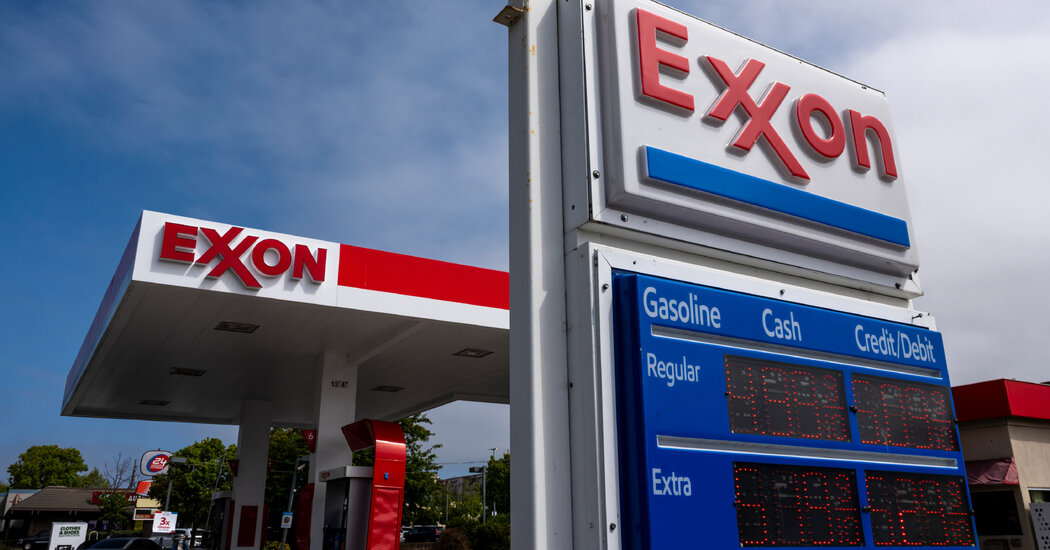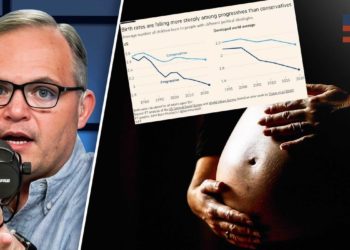Exxon Mobil sued California late Friday claiming that two new state laws that aim to fight climate change would violate the oil company’s free speech rights.
The two laws, passed in 2023 and known as the California Climate Accountability Package, would require thousands of large companies doing business in the state to calculate and report the greenhouse gas emissions created by the use of their products, along with the business risks that climate change represents for the companies.
Requiring companies to calculate the climate damage caused by people using their products is a major change. In the past, climate regulations have generally required companies to report their own corporate emissions, but not emissions caused by people using the products that they manufacture and sell.
For oil companies like Exxon, the new rules, which begin to take effect in 2026, mean calculating and then reporting the emissions caused by activities like the use of gas or diesel in cars and trucks. Transportation is one of the major contributors to the emission of greenhouse gases like carbon dioxide, which warm the world by acting as a blanket in the atmosphere, trapping the heat of the sun.
Exxon’s lawsuit, filed in the United States District Court for the Eastern District of California, argued that the laws would force the company to use flawed methodology to calculate these emissions and would misrepresent the role that Exxon and its products play in warming the world. The suit asked a judge to block the state from enforcing the laws against it.
“The statutes compel Exxon Mobil to trumpet California’s preferred message even though Exxon Mobil believes the speech is misleading and misguided,” the lawsuit said.
California’s lawmakers have been at the forefront of efforts to reduce the emissions of greenhouse gases, and the state’s policies often influence other states to follow its lead. Exxon’s lawsuit argues that the two California laws, instead of helping to curb emissions, aim to punish big businesses.
“While California might believe that making Exxon Mobil report historical emissions for an oil refinery acquired in Canada or speculative business risks for a Kazakhstan pipeline is the best way to spur climate solutions, Exxon Mobil disagrees,” the lawsuit said. “The First Amendment bars California from pursuing a policy of stigmatization by forcing Exxon Mobil to describe its non-California business activities using the State’s preferred framing.”
The California governor’s office and other state officials did not immediately respond to requests for comment. The lawsuit named officials on the California Air Resources Board, a state agency that oversees air and climate matters, and the attorney general, Rob Bonta.
One of the two laws that Exxon is challenging, SB 253, requires businesses to compute emissions using a methodology that focuses on a company’s overall worldwide emissions. Exxon’s lawsuit argues that would put disproportionate blame on large companies simply because of their size.
The methodology California uses, called the Greenhouse Gas Protocol, was developed by two organizations: The World Resources Institute, a research group in Washington, and the World Business Council for Sustainable Development, a network of more than 250 prominent companies including some of Exxon’s competitors, like Chevron and Shell.
Exxon’s lawsuit says the state should use a different approach that would reward more efficient companies. The lawsuit also claims that the inclusion of emissions caused by the use of a company’s products by consumers — not just the emissions created by a company’s activities as a business — leads to double counting and confusion.
Exxon’s lawsuit also argues that a California law should apply only to in-state activity, and not require reporting or calculations of emissions beyond the state’s borders. It said that a vast majority of Exxon’s principal business operations occur outside of California, and that the company does not explore for, produce, manufacture or transport crude oil or natural gas in the state, nor does it do any refining there. Exxon is headquartered in Texas, with operations in more than 60 countries.
The second law that Exxon is challenging, SB 261, requires companies to disclose climate-related risks they face from, say, coastal oil facilities that could flood during storms, or changes to government policies that could have financial implications for them. Exxon said that it already provided such information under federal securities laws, and that the state provision would require it to use a “very speculative” framework that differs greatly from the federal one.
The suit argued that the laws are an example of overreach by California officials trying to govern corporate speech. The aim of the laws, it said, was to publicly shame big business, not effectively regulate emissions.
The lawsuit is similar to one filed by the U.S. Chamber of Commerce and other business groups in January 2024. In that case, Judge Otis D. Wright II of the U.S. District Court for Central California dismissed some of the claims early this year, allowing only the First Amendment claim to continue. He denied the plaintiffs’ request for a preliminary injunction to block the laws from taking effect in August.
The Chamber of Commerce then filed an appeal with the U.S. Court of Appeals for the Ninth Circuit.
The chamber’s lawsuit also named as defendants leaders of the California Air Resources Board, and the attorney general, Mr. Bonta.
In court filings in the Chamber of Commerce lawsuit, Mr. Bonta’s office argued that the laws actually serve a core First Amendment goal by allowing well-informed financial decision-making. “Plaintiffs have yet to explain how the laws compel even a single company to state a political or ideological opinion,” Caitlan McLoon, a deputy attorney general, wrote in a brief last month.
In that case, a few groups have filed amicus briefs with the appellate court on both sides of the fight. The Washington Legal Foundation, which supports free-enterprise principles, argued that the laws force businesses to parrot the state’s views. Ceres, a business network that supports a transition to cleaner energy, said the laws had broad support from corporations and investors. In the latest filing, on Friday, FarmSTAND, which opposes industrial animal agriculture, said the laws were important to counter meat and dairy companies engaging in what the group called greenwashing, or deceptive publicity about their environmental practices.
At the end of the Biden administration, the Securities and Exchange Commission had been nearing implementation of new federal climate disclosure rules. Those rules were also challenged in court, and in March, shortly after the start of the current Trump administration, the commission voted to end its legal defense of the rules.
The rules remain effectively shelved, but not repealed, according to Jayson O’Neill, senior director of climate finance for Focal Point Strategy Group, a communications firm that works with climate and good-governance groups. He noted that other states have also proposed their own climate disclosure laws.
The European Union is also moving forward with new climate disclosure rules. In a letter this week to the E.U., Energy Secretary Chris Wright and his Qatari counterpart, Saad Sherida al-Kaabi, minister of state for energy affairs, raised concerns about the measure, the Corporate Sustainability Due Diligence Directive. They called on the E.U. to repeal the directive or remove provisions that they said would be economically damaging.
Karen Zraick covers legal affairs for the Climate desk and the courtroom clashes playing out over climate and environmental policy.
The post Exxon Sues California Over New Climate Disclosure Laws appeared first on New York Times.




